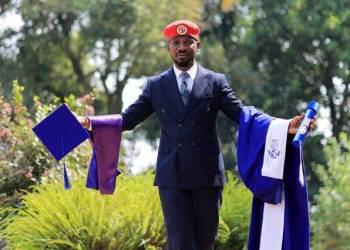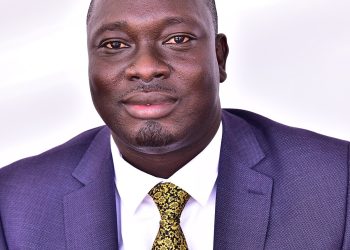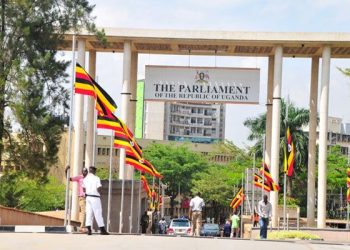MPs on the sectoral committee on Presidential Affairs have made several recommendations that left the main protagonists in the city politics losing out on key proposals.
The 21-member Parliamentary committee, headed by Adjumani Woman MP, Jesca Ababiku, studied and analysed the Kampala Capital City Authority (KCCA) Bill 2015 and came up with a report which was tabled before Parliament recently.
Their proposals have bad news for the minister of Kampala, Betty Kamya; the Lord Mayor, Erias Lukwago and the division mayors. The committee rejected the Government’s position to make the minister of Kampala the political head of the capital city.
The members noted that whereas the bill seeks to re-assert the powers of the Central Government in the Administration of the City by vesting more powers in the minister and making him or her the city’s political head, that would undermine the principle of decentralisation and local government system adopted by the Constituent Assembly in 1995.
While coming up with the bill, the Kampala minister had argued that despite the social and economic improvements in the city, there has been an inadequacy in the aspect of governance, which has, to an extent, impeded smooth management and causing paralysis in the city.
The members of the committee relied on the Constitutional Court’s ruling of Constitutional petition No, 09 of 2016, in which Alex Oryanga challenged the election of Kampala Woman MP, Nabillah Naggayi Sempala. In the case, which committee members noted was of public interest, Oryanga had asked court to determine whether the election of Naggayi was constitutional, following the 2005 amendment of Article 5 of the 1995 Constitution, which changed Kampala from a district to a city status.
And in an unanimous ruling, the justices noted that despite the Constitutional amendment that elevated Kampala to a city status, city residents must continue to enjoy equal representation in Parliament by electing people to occupy all elective posts.
“The location, demarcation and people of Kampala remained the same and mere change in description from district to city cannot disenfranchise the people of Kampala,” the judges noted.
Both the Uganda Law Reform Commission and Uganda Law Society (ULS), in their submissions before the committee, had also warned that accepting the proposal would frustrate the voices of the people of Kampala in exercising their constitutional rights.
ULS observed that clause 35 (b) of the bill that seeks to divert political and executive powers from the elected leadership of Kampala to appointed leaders was a violation of Article 1. The committee, therefore, recommended that the proposed amendment to provide for the minister as the political head of the capital city be deleted from the bill.
That the provision for the function of the political head of the city is not necessary because it is not a function. However, in terms of chain of command, the Lord Mayor is answerable to the authority and the minister.
During the 2nd reading of the bill in Parliament last week, Ababiku explained the inconsistencies in the Bill that forced the committee to reject some of the key proposals. However, the government, which boasts of the majority MPs in the house, has not said anything, probably waiting for the time to vote for the bill in Parliament to strike back.
The committee’s recommendations are vital because they guide Parliament in making final decisions on whether to pass the bill or not before sending it to the President to assent to it. But they are not final in themselves. This is not necessarily good news for Lukwago, who is pushing for the Lord Mayor to be the political head.
That is why Lukwago looks at the government’s intention of fronting the Bill as an attempt to grab the powers of his office. Lukwago had indicated that moving the powers for the determination of service delivery from the elected leaders in the city would undermine the principles of good governance.
He argued that taking away the role of policy-making from the councillors, who consult the people; means the policies will most likely be misdirected.
However, a clear win for Lukwago was the committee’s rejection of a proposal that seeks to make the Lord Mayor and his deputy to be elected from among the councillors. The Lord Mayor is currently elected under universal suffrage. There is concern in Lukwago’s camp that if the Lord Mayor is elected from among the councillors, he may not get the chance during the general elections to campaign for his choice of candidates, who would go through and later vote for him at City Hall to become the Lord Mayor.
Lukwago also suffered a setback when the committee recommended that City Hall should have a speaker and deputy speaker elected from within the councillors to preside over the council meetings. Currently, the Lord Mayor calls the shot at City Hall. He is in charge of calling council meetings and presiding over them. But the outgoing KCCA executive director, Jennifer Musisi and her technical team, have complained about Lukwago’s failure to call and follow procedures of organizing council meetings. Lukwago has vowed to engage both the public and legal means should Parliament pass the bill intended to trim the powers of his office.
However, Makindye East MP, Ibrahim Kasozi, who is one of the committee members, told Saturday Vision that the committee found it wise to create the speaker’s office for the smooth running of the city, based on the principle of labour. Constitutional lawyer, Benjamin Katana also argued that the move to separate powers at City Hall could boost service delivery. However, he said the challenge with the current bill is that it is not in good faith because the government is targeting one person, Lukwago.































































